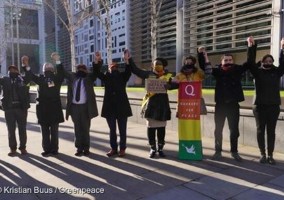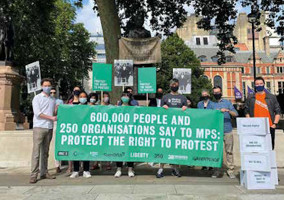The UK has been downgraded from “narrowed” to “obstructed” in an annual global index of civic freedoms, which says the decline in protest rights is delegitimising civil society action.
CIVICUS Monitor’s annual report, People Power Under Attack 2022, found that there has been “a significant deterioration in civic freedoms” in the UK over the past few years, notably “the right to freedom of peaceful assembly”.
It said this curtailing of protest rights took place “within a broader context of restrictions that are delegitimising civil society action”.
Meanwhile, a new survey by the Sheila McKechnie Foundation (SMK) showed that more than nine in 10 campaigners and activists think there are threats to the freedom to organise, contribute to public debate, influence political decisions or protest.
Some 72% of respondents to the SMK report said attitudes among politicians towards civil society campaigning have become more negative in the past year.
CIVICUS report: Deterioration in civic freedoms
The UK was first added to CIVICUS Monitor’s watchlist in September 2021 after the government first proposed several laws which it deemed to “threaten fundamental rights and democratic checks and balances on state power”.
CIVICUS’s latest report said that the civic space in the UK has been deteriorating over the past three years, with the implementation of new restrictive legislation, which led to the country’s rating downgrading from narrowed to obstructed.
The report cited two pieces of legislation that “seriously” undermine the right to protest and give “extensive” powers to the police and home secretary, namely the Police, Crime, Sentencing and Courts Act 2022 and the public order bill currently going through parliament.
It said. “The decline in protest rights is taking place within a broader context of restrictions that are delegitimising civil society action.”
The report gave the example of the government’s attempts to expel asylum seekers to Rwanda – halted by the ECHR in June – which contributed to an “increased critical sentiment among some politicians and sections of the media that support the ruling party towards civil society campaigning”.
“Some ministers and members of parliament have smeared and publicly vilified civil society, particularly civil society working on climate change, antiracism and migrants’ and refugee’s rights,” it said.
SMK report: Politicians are more ‘hostile’
Separately, SMK conducted a survey of 123 campaigners and activists between December 2022 and February 2023 to understand the experience of people involved in social change.
The majority of respondents (72%) said attitudes among politicians towards civil society campaigning have become more negative in the past year.
Almost 60% said that engaging with ministers has become less effective while 41% said the same about responding to government consultation.
Meanwhile, 43% said they sometimes censor themselves for fear of political backlash, for fear of damaging public and political relationships among other things.
One respondent commented: “I think the political reception for campaigning has become increasingly hostile - it is hard to make progress with the kinds of campaigning we're used to… It feels like charities and campaigners have been cemented in opposition spaces, rather than as cooperative voices, which can be challenging.”
SMK’s chief executive Sue Tibballs said the downgrade of UK civic space comes as “little surprise” to campaigners due to the country’s “harmful legislation and hostile rhetoric for years”.
She added: “Despite this, we’re seeing greater determination to speak up for their causes – and that is happening at every level. I speak to trustees and chief executives who are ‘feeling the fear and doing it anyway’ by taking a more sophisticated approach to risk, one that also considers the risk of staying silent, and building organisational confidence that seeking change is a vital part of their mission.”
Bond: ‘UK becoming increasingly authoritarian’
Stephanie Draper, chief executive officer of Bond, said: “The downgrade reflects the worrying trends we are seeing in restrictions across civil society that are threatening our democracy. The government should be setting a positive example to countries that have clamped down on civic space.
“The UK is becoming increasingly authoritarian and is among concerning company in the CIVICUS Monitor ratings as restrictive laws and dangerous rhetoric are creating a hostile environment towards civil society in the UK. Decision makers across all political parties should be alarmed and make it a priority to protect our rights and freedoms.”
A government spokesperson told Civil Society News: “This government is committed to protecting freedom of expression and protest, which is a fundamental principle of our democracy.
“However, the right to protest must be balanced with preserving the ability of the law-abiding majority to go about their daily business. We must ensure there is a proper balance between the rights of individuals, our vital national security, essential services and effective government.”
Related articles












